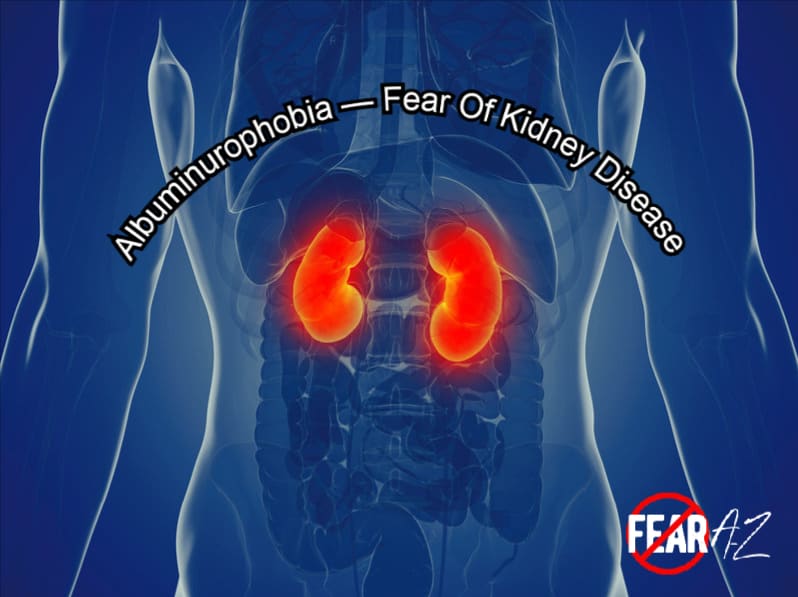Share This Article
Diagnosing the Fear of Kidney Disease
Do you worry you may develop kidney disease? Does talk of a relative or friend with kidney disease leave you trembling and breaking into a sweat?
You just might have albuminurophobia.
So what is albuminurophobia? It’s the fear of kidney disease.
It’s one of those uncommon, irrational fears that, although rare, can cause severe distress and anxiety in people who have it.
People have plenty of questions run through their minds when they first discover this phobia. What causes the fear? How you can identify if you have it? What are the symptoms, the origins of the fear, and so on?
The good news is, like all phobias, albuminurophobia is treatable. Being aware that you have the fear and exploring the available treatment options can help you lead a normal life.

What Is Albuminurophobia?
The fear of developing kidney disease is called albuminurophobia. Anyone who goes through this phobia has the underlying fear and anxiety of developing any condition that may affect the kidneys.
Sure, the development of the disease can send them into a frenzy of terror. But just thinking about having kidney disease is enough to send chills down their spine.
The term albuminurophobia is the combination of two words—albuminuria, the presence of albumin protein in the urine that may indicate kidney problems, and phobia, meaning a profound aversion to an object.
Albuminurophobia Causes
There can be many reasons that lead to the origins of albuminurophobia. Usually, people who have had family members go through some mental illnesses or anxiety disorders are at a greater risk of developing a phobia.
Certain environmental factors or an emotionally painful or traumatic experience in the past, like a failed kidney operation, or the development of health issues due to a weak kidney, can also lead to albuminurophobia.
Sometimes, even witnessing a loved one experience kidney disorder or kidney disease can cause a person to develop a phobia of it, too.
Living with Albuminurophobia
Living with a phobia like albuminurophobia can have a negative impact on your life.
Even without actually being in the presence of the source of your fear, you may feel dread and fear just thinking about it. Visuals of anything related to the object of your fear may trigger a fearful response.
Performing everyday routine activities may seem out of reach. Lack of concentration, focus, and motivation can prevent you from completing even the smallest tasks. Your physical and mental well-being become affected.
Symptoms of Albuminurophobia
Most symptoms associated with albuminurophobia are similar to symptoms seen with any other phobia. Some of the psychological and physical symptoms are as follows:
Psychological Symptoms
- Losing control over your body
- Severe anxiety and panic
- Self-blame and self-guilt
- Mood swings accompanied by irritation and annoyance
- Withdrawing and detaching from others
- Feelings of hopelessness
Physical Symptoms
- Sweating
- Palpitations
- Loss of breath
- Cold tremors
- Feeling dizzy
- Choking sensation
- Fever and tremors
- Headaches
- Nausea
- Tightness in the chest
- Hyperventilation
- High blood pressure
Dealing with Albuminurophobia
Dealing with albuminurophobia can be difficult, but it’s not impossible. Through routes of self-help, meditation, exercise, plenty of sleep, proper food, and mindfulness, you can efficiently deal with your worst fears.
What helps in dealing with fears is acknowledging them and accepting the fact that you have them. Don’t run away from facing your worries and fears. The sooner you face the source of anxiety and terror, the sooner you’ll begin to find some ease in dealing with it.
In the event you think your phobias have heightened and you’re unable to overcome them through simple measures and routine changes, don’t shy away from seeking professional help. Professional therapy employs the proper treatment at the right time to help you overcome your fears faster.
Albuminurophobia Treatment
Although no specific treatments have been devised for albuminurophobia, there are certain general treatment methods available. Let’s take a look at them:
- Mindfulness-Based Stress Reduction (MBSR)
Mindfulness-based stress reduction (MBSR) helps to reduce stress and anxiety by focusing on stress-releasing techniques. The therapy helps combat stress, panic attacks, and other symptoms that result from a phobia. - Exposure Therapy
Exposure therapy helps desensitize the patient to their source of phobia—kidney disease in this case. The therapist gradually exposes the patient to certain concepts related to their fear eventually helping them overcome it. - Natural Language Processing Techniques
Natural language processing techniques are a safe and quick way to treat phobias. The therapist takes the patient through different stages of accessing their phobias in a safe and secure environment. They then help them gradually disassociate themselves from the fears. - Cognitive Behavioral Therapy
Cognitive behavioral therapy helps in managing the way you think about your fears. When you face the source of your fear, it’s likely to trigger a negative response. This therapy helps you gain control over that negative emotional response.
How to Cope with Albuminurophobia
Albuminurophobia, just like any common phobia, can’t be overlooked. If you’re dealing with this phobia, there are a few coping measures you can adopt to live a more peaceful life.
- Learn a few breathing relaxation techniques that you can employ anytime your anxiety gets the better of you.
- Make a journal to jot down every source of your fear. If you’ve started professional therapy or are making other efforts toward dealing with your phobia, make a note of your behavioral changes. Your improving trajectory will motivate you to face your fear with confidence.
- Try to distract your mind with a favorite hobby anytime the thought of kidney disease crosses your mind.
- Educate yourself about your fear.
- Make sure to acknowledge your fear each time it makes an appearance. You can also join support groups and counseling sessions to discuss your fears with people who share the same phobia.
- High consumption of caffeine can elevate your anxiety. Avoid caffeine-infused beverages when you are on the journey of coping with fear.
Final Words on Albuminurophobia
Dealing with phobias requires a high level of commitment and perseverance. No phobia is easy to overcome; however, with patience and consistency, there is no phobia you can’t manage.
Any fear, including the fear of kidney disease, can deter you from carrying on with your everyday activities. Panic attacks, feelings of detachment, and a racing heart may make their appearance every now and then throughout your day. However, a little bit of self-love, meditation, practical therapy sessions, and the acknowledgment of your fears will help you conquer albuminurophobia in no time.




